

 ,
, 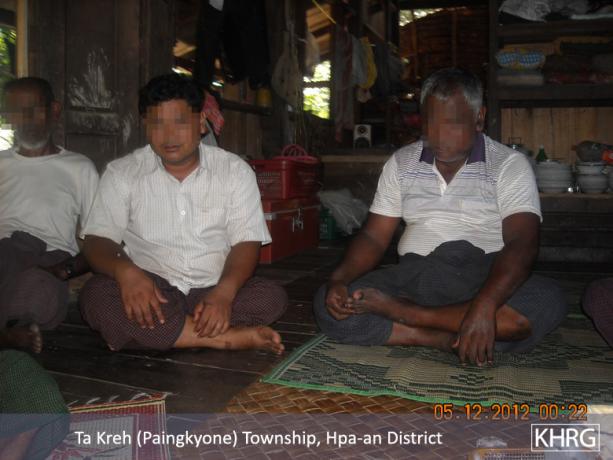
The above photos were taken on December 5th2012 by a community member trained by KHRG. The photo on the left shows the village road and Muslim mosquein T--- village, Ta Kreh Township, Hpa-an District. The photo on the right shows three Muslim villagers who attend this mosque, some of whom were interviewed by the community member, during which they explained that they feel helpless, as the events happening in Rakhine State and Mandalay Division also affect T--- villagers. They explained that they are afraid to buy things from Karen people and that Karen people now cannot sell things to the Muslim community. These villagers also informed the community member that they had lived among the Karen people their entire lives, during which no major problems occurred, however, they are now afraid that problems similar to those,which occurred between Christians and Buddhists in the past, will occur between Muslim and Buddhist villagers; finally, they believe that Burmese people are instigating these problems. [Photos: KHRG]
The following situation update was written by a community member in Hpa-an District who has been trained by KHRG to monitor human rights conditions. It is presented below translated exactly as originally written, save for minor edits for clarity and security.[1] This report was received along with other information from Hpa-an District, including 16 interviews, one other situation update and 155 photographs.[2]
I went to T--- village, Htee Hpoh T'Ray village tract, Ta Kreh Township and I met with Muslim villagers: one medic and two villagers. Before I met with them, I heard the villagers saying to each other that they could not go and buy things from the Muslim [owned] shop. [They said]," If we go and buy [from shops owned by Muslims], and if people see us, they will ask [fine] us 100,000 kyat (US $115.94)."[3] When I went and met with four Muslims on December 5th 2012, I took photos of the Muslims, the mosque, the village street, and I took photos when they were travelling within the village. When I asked them how it happened [the prohibitions on relations with Muslims], they told me about the things that happened in Rakhine State,[4] concerning Buddhist and Muslim people torturing [tormenting] each other. The villagers saw it [footage from Rakhine State] on a CD, which was released, and [then] the monk published an order letter including four points. They [the Muslim villagers] copied it [the order letter] secretly and gave it to me. On December 6th 2012, when I arrived in N--- village, Ka Lah Kon village tract, T'Nay Hsah Township, I met with a Muslim medic and I interviewed him about the related issues. I did not take their photos, but I also interviewed a Muslim man whose name is Maung S---, 32 years old. When I interviewed him, he seemed like he was afraid of [something].
On December 7th 2012, I arrived back to Noh Kay village tract and the monks called the four villages to [attend] a meeting in M--- Monastery compound, and the villages are P--- village, A--- village, W--- village and M--- village. I saw that there were 41 villagers in attendance at the meeting and they held the meeting under the roof. There was only one monk and he took out the order letter that includes the four points. When they [the villagers and the monk] met, they discussed the four points in the meeting. The photos that I have taken are of the order letter that the big [powerful] monk released, and the meeting took 37 minutes. When the meeting ended, and when the villagers came back, I asked some villagers secretly regarding their opinion on the order letter, and they said that: "People will ask us to fight against each other again; in the past, the Baptists and the Buddhists, now, the Muslims and the Buddhists." I see that now, the monks have already had meetings in nearly all of the village tracts, in the villages and in the townships. I see that there is no hurting [violence] yet, but trading among each group has reduced, to only one third [of what it was before]. Their communication has also decreased compared with in the past.
Karen State, Hpa-an Town
Four Rules of the "Group for Maintaining and Protecting the Mission of Different religious sects"
1. The house, plantations and farmland of the ancestors owned by the Buddhists must not be sold to Muslims.
2. Buddhist women must not marry Muslims.
3. Buddhists should only buy from Buddhist shops.
4. Buddhists must not buy, build, or rent houses, plantation or farmland for Muslims in their names.
If you break the above four rules, you will be punished effectively.
(The decision from the special meeting of the "Group for Maintaining and Protecting Different religious sects," Mission held in M---Monastery, Hpa-an Town at 1:00 PM, on Wan Moon Day, 9th Wagaung, 1374 [Burmese calendar], Monday, September 10th 2012)
1. Prohibition of Buddhists from selling, renting or pawning their houses, farms and lands to Muslims.
2. Prohibition of Buddhist women from marriage with Muslims.
3. Buddhists should patronize the Buddhist shops only.
4. Prohibition of Buddhists from using their names for the buying or renting of Buddhist owned houses, land, farming land, or orchard land to Muslims.[5]
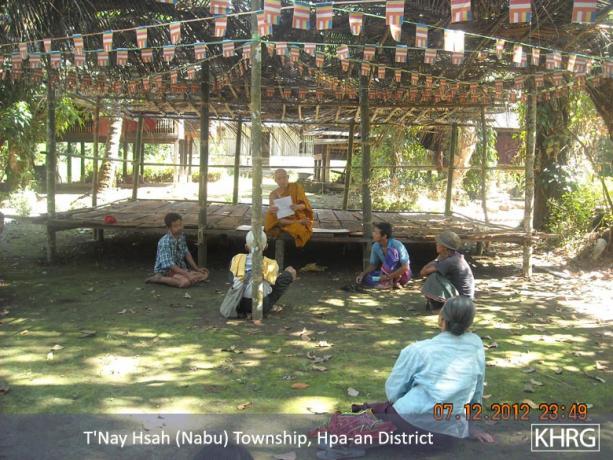 ,
, 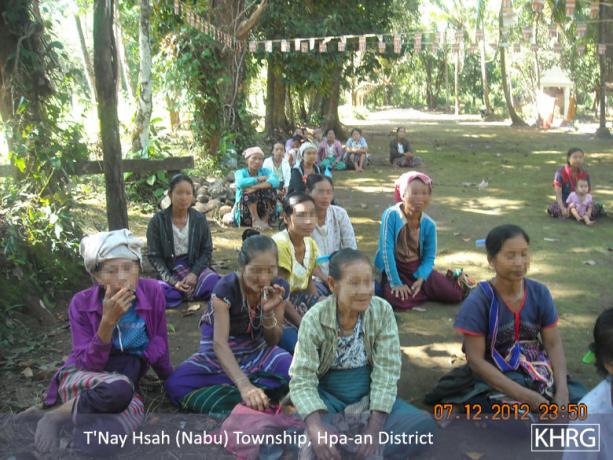 ,
,  ,
, 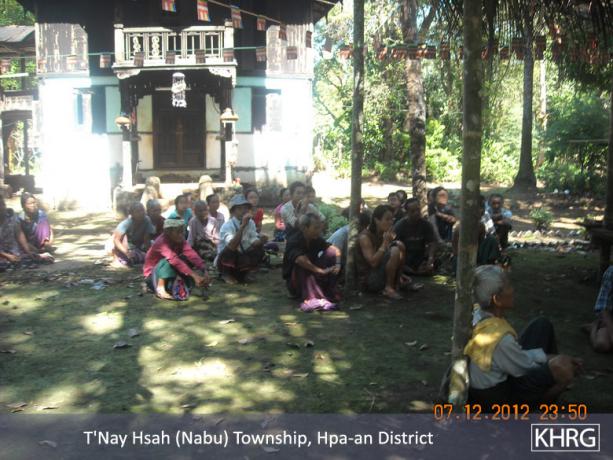 ,
, 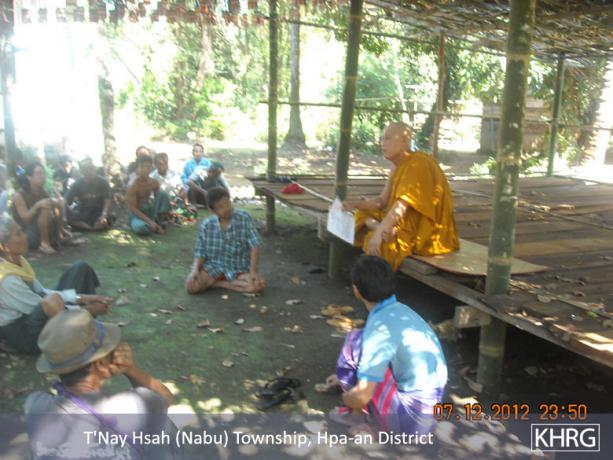 ,
, 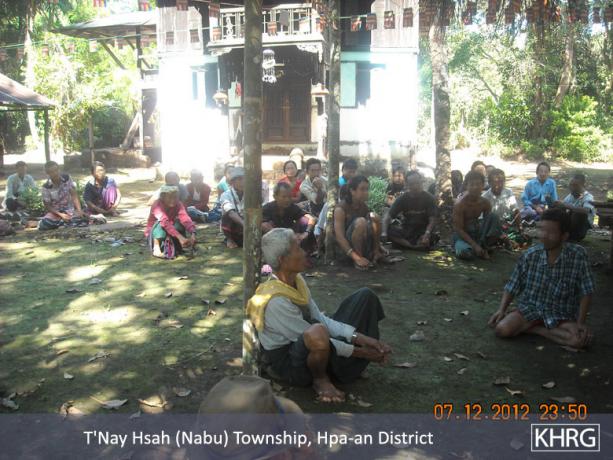
The above photos were taken on December 7th 2012 by a community member, and show a monk and villagers sitting on the grounds ofthe M--- village monastery in Noh Kay village tract, T’Nay Hsah Township, Hpa-an District. According to the community member who took these photos, the M--- Monastery monks called villagers from P---, A---, W--- and M--- villages to attend this December 7th meeting. During the meeting, attended by 41 villagers, the monk read a letter outlining the forms of unacceptable conduct for Buddhist villagers in their relations with Muslim villagers; villagers were informed by the monk they had to follow the instructions in the letter and were told that if they did not follow the four points, they would be fined and charged; finally, the monk asked the villagers if they understood or not. [Photos:KHRG]
The following situation update was written by a community member in Hpa-an District who has been trained by KHRG to monitor human rights conditions. It is presented below translated exactly as originally written, save for minor edits for clarity and security.[1] This report was received along with other information from Hpa-an District, including 16 interviews, one other situation update and 155 photographs.[2]
I went to T--- village, Htee Hpoh T'Ray village tract, Ta Kreh Township and I met with Muslim villagers: one medic and two villagers. Before I met with them, I heard the villagers saying to each other that they could not go and buy things from the Muslim [owned] shop. [They said]," If we go and buy [from shops owned by Muslims], and if people see us, they will ask [fine] us 100,000 kyat (US $115.94)."[3] When I went and met with four Muslims on December 5th 2012, I took photos of the Muslims, the mosque, the village street, and I took photos when they were travelling within the village. When I asked them how it happened [the prohibitions on relations with Muslims], they told me about the things that happened in Rakhine State,[4] concerning Buddhist and Muslim people torturing [tormenting] each other. The villagers saw it [footage from Rakhine State] on a CD, which was released, and [then] the monk published an order letter including four points. They [the Muslim villagers] copied it [the order letter] secretly and gave it to me. On December 6th 2012, when I arrived in N--- village, Ka Lah Kon village tract, T'Nay Hsah Township, I met with a Muslim medic and I interviewed him about the related issues. I did not take their photos, but I also interviewed a Muslim man whose name is Maung S---, 32 years old. When I interviewed him, he seemed like he was afraid of [something].
On December 7th 2012, I arrived back to Noh Kay village tract and the monks called the four villages to [attend] a meeting in M--- Monastery compound, and the villages are P--- village, A--- village, W--- village and M--- village. I saw that there were 41 villagers in attendance at the meeting and they held the meeting under the roof. There was only one monk and he took out the order letter that includes the four points. When they [the villagers and the monk] met, they discussed the four points in the meeting. The photos that I have taken are of the order letter that the big [powerful] monk released, and the meeting took 37 minutes. When the meeting ended, and when the villagers came back, I asked some villagers secretly regarding their opinion on the order letter, and they said that: "People will ask us to fight against each other again; in the past, the Baptists and the Buddhists, now, the Muslims and the Buddhists." I see that now, the monks have already had meetings in nearly all of the village tracts, in the villages and in the townships. I see that there is no hurting [violence] yet, but trading among each group has reduced, to only one third [of what it was before]. Their communication has also decreased compared with in the past.
Karen State, Hpa-an Town
Four Rules of the "Group for Maintaining and Protecting the Mission of Different religious sects"
1. The house, plantations and farmland of the ancestors owned by the Buddhists must not be sold to Muslims.
2. Buddhist women must not marry Muslims.
3. Buddhists should only buy from Buddhist shops.
4. Buddhists must not buy, build, or rent houses, plantation or farmland for Muslims in their names.
If you break the above four rules, you will be punished effectively.
(The decision from the special meeting of the "Group for Maintaining and Protecting Different religious sects," Mission held in M---Monastery, Hpa-an Town at 1:00 PM, on Wan Moon Day, 9th Wagaung, 1374 [Burmese calendar], Monday, September 10th 2012)
1. Prohibition of Buddhists from selling, renting or pawning their houses, farms and lands to Muslims.
2. Prohibition of Buddhist women from marriage with Muslims.
3. Buddhists should patronize the Buddhist shops only.
4. Prohibition of Buddhists from using their names for the buying or renting of Buddhist owned houses, land, farming land, or orchard land to Muslims.[5]
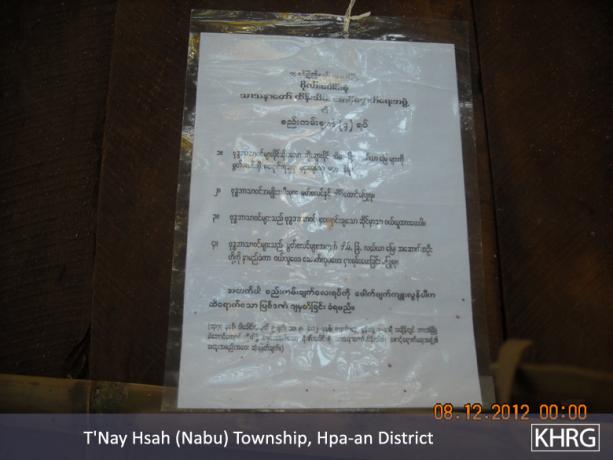
The above photo was taken on December 8th 2012 by a community member in M--- village, Noh Kay village tract,
T’Nay Hsah Township, and shows the letter distributed by M--- Monastery during a meeting on December 7th, which
was attended by 41 villagers from four villages in the area. The letter, written in Burmese, and translated on the right
by KHRG staff, includes four policies regulating relations between Buddhist and Muslim villagers. [Photo: KHRG]
The following situation update was written by a community member in Hpa-an District who has been trained by KHRG to monitor human rights conditions. It is presented below translated exactly as originally written, save for minor edits for clarity and security.[1] This report was received along with other information from Hpa-an District, including 16 interviews, one other situation update and 155 photographs.[2]
I went to T--- village, Htee Hpoh T'Ray village tract, Ta Kreh Township and I met with Muslim villagers: one medic and two villagers. Before I met with them, I heard the villagers saying to each other that they could not go and buy things from the Muslim [owned] shop. [They said]," If we go and buy [from shops owned by Muslims], and if people see us, they will ask [fine] us 100,000 kyat (US $115.94)."[3] When I went and met with four Muslims on December 5th 2012, I took photos of the Muslims, the mosque, the village street, and I took photos when they were travelling within the village. When I asked them how it happened [the prohibitions on relations with Muslims], they told me about the things that happened in Rakhine State,[4] concerning Buddhist and Muslim people torturing [tormenting] each other. The villagers saw it [footage from Rakhine State] on a CD, which was released, and [then] the monk published an order letter including four points. They [the Muslim villagers] copied it [the order letter] secretly and gave it to me. On December 6th 2012, when I arrived in N--- village, Ka Lah Kon village tract, T'Nay Hsah Township, I met with a Muslim medic and I interviewed him about the related issues. I did not take their photos, but I also interviewed a Muslim man whose name is Maung S---, 32 years old. When I interviewed him, he seemed like he was afraid of [something].
On December 7th 2012, I arrived back to Noh Kay village tract and the monks called the four villages to [attend] a meeting in M--- Monastery compound, and the villages are P--- village, A--- village, W--- village and M--- village. I saw that there were 41 villagers in attendance at the meeting and they held the meeting under the roof. There was only one monk and he took out the order letter that includes the four points. When they [the villagers and the monk] met, they discussed the four points in the meeting. The photos that I have taken are of the order letter that the big [powerful] monk released, and the meeting took 37 minutes. When the meeting ended, and when the villagers came back, I asked some villagers secretly regarding their opinion on the order letter, and they said that: "People will ask us to fight against each other again; in the past, the Baptists and the Buddhists, now, the Muslims and the Buddhists." I see that now, the monks have already had meetings in nearly all of the village tracts, in the villages and in the townships. I see that there is no hurting [violence] yet, but trading among each group has reduced, to only one third [of what it was before]. Their communication has also decreased compared with in the past.
Karen State, Hpa-an Town
Four Rules of the "Group for Maintaining and Protecting the Mission of Different religious sects"
1. The house, plantations and farmland of the ancestors owned by the Buddhists must not be sold to Muslims.
2. Buddhist women must not marry Muslims.
3. Buddhists should only buy from Buddhist shops.
4. Buddhists must not buy, build, or rent houses, plantation or farmland for Muslims in their names.
If you break the above four rules, you will be punished effectively.
(The decision from the special meeting of the "Group for Maintaining and Protecting Different religious sects," Mission held in M---Monastery, Hpa-an Town at 1:00 PM, on Wan Moon Day, 9th Wagaung, 1374 [Burmese calendar], Monday, September 10th 2012)
1. Prohibition of Buddhists from selling, renting or pawning their houses, farms and lands to Muslims.
2. Prohibition of Buddhist women from marriage with Muslims.
3. Buddhists should patronize the Buddhist shops only.
4. Prohibition of Buddhists from using their names for the buying or renting of Buddhist owned houses, land, farming land, or orchard land to Muslims.[5]